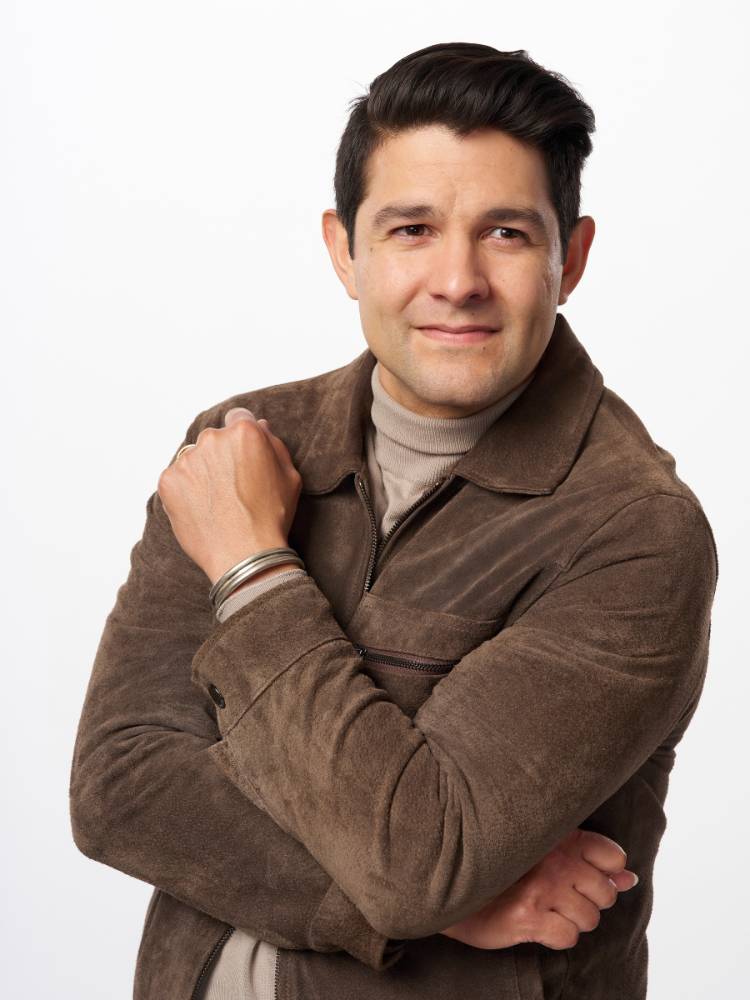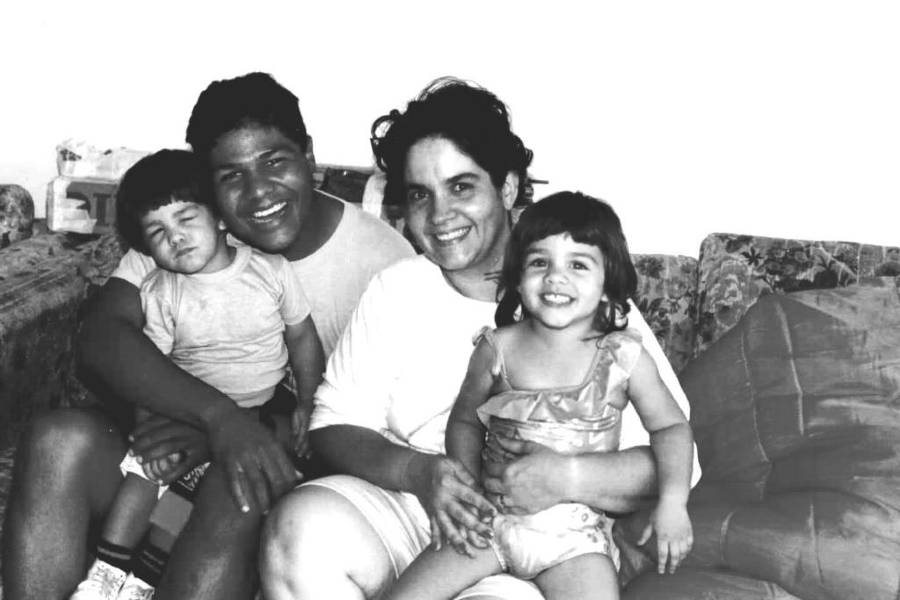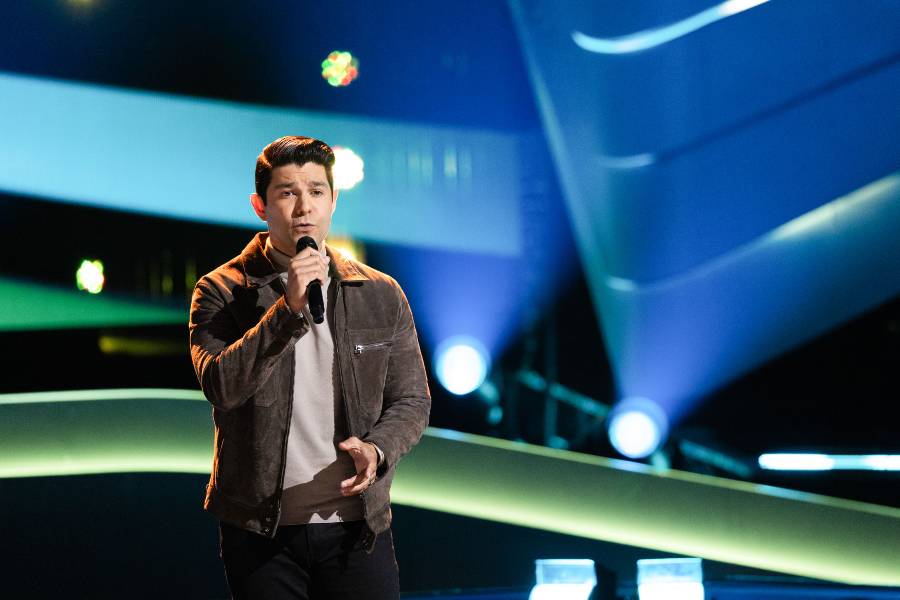Commercial music instructor Carlos Santiago competes on Season 27 of The Voice
Inspired by support of family, Santiago advances past the Blind Audition round for spot on Team Michael Bublé
Kim Chaudoin |

Carlos Santiago, adjunct commercial music instructor at Lipscomb University, competes in the Blind Ambition round of The Voice, Season 27, on Feb. 3. Photo: NBC The Voice.
From the time he was a toddler, Carlos Santiago has been immersed in music. His childhood in Caguas, Puerto Rico, was filled with the sounds of harmonies sung by family members, church choir rehearsals and impromptu concerts at family gatherings.
Music was never just an activity — it was a way of life.
It is a pathway that has led Santiago to a career that he loves, to an adjunct commercial voice instructor role in Lipscomb University’s School of Music and now to NBC’s The Voice.

Carlos Santiago. Photo: NBC The Voice.
Musical roots
When Santiago was young, his parents, Isabel and Carlos, formed a traveling gospel duet called Isacar, comprised of the first three letters of each of their names and a biblical reference to Issachar, one of the 12 tribes of Israel. He often found himself napping in the back of his father’s 1986 Ford Bronco as they journeyed across the island to sing at various churches. He also watched with keen interest his aunt, Rosa Moreno, who was a skilled guitarist and choir director.
“My aunt had a really big influence on my musical interests, and I wanted to be a guitar player like her,” recalls Santiago. “Any family gathering was filled with music and conversation. It was a very lively bunch every time we got together and I remember it fondly.”
Though Santiago says the love of music was ingrained in him from an early age, his path to embracing it as a career was not always a smooth one. When he entered his pre-teenage years, Santiago said he began to develop negative feelings toward music.
“I had begun to resent my parents and their desire to do music so much when I entered my preteens. I was playing baseball, and I had friends that I wanted to hang out with. I just wanted to be a kid,” he explains. “Anytime the church doors were open, I was there, or if it meant going to a different church to go sing, I was singing with them. When we got older my sister and I along with my parents were all singing as a family. I got to a point where I began to not like that. I would do it, but I didn't enjoy it. So, I got to a point where I didn't want to sing for a few years.”

A young Carlos Santiago with his parents and sister, Rosabel.
But at age 13 when Santiago and his family moved from Puerto Rico to Jacksonville, Florida, for his father’s work, music became his refuge in an unfamiliar culture. Though he was bilingual and had a good command of the English language, Santiago says he was still having to adapt to a new culture, trying to find new friends and adjusting to a new school.
“It was hard to make the adjustment,” he admits. “So, music became a refuge for me in a culture that I didn't really understand, even though I appreciated it.”
Santiago says he began to fall in love with music and singing again. His father enrolled him in guitar lessons and he started leading in the youth group at his church. But after attending a concert by Christian artist Steve Green, Santiago knew — without a doubt — that he wanted to pursue music as a career.
“On the way home from the concert, I told my dad that I needed to talk to him. I had wanted to be a mechanical engineer,” he remembers, “but I felt a shift in my heart — I remember very specifically — and it said ‘this is what you want to do.’”
His father, who had once been discouraged from pursuing his own artistic dreams, vowed to support his son fully.
“My dad was a great painter and did not have the encouragement from his father to pursue that as a career because he didn’t think he could make a living at it,” he says. “He had come to the same fork in the road as a young man and I think, perhaps, he could see himself in me.”
“He gave me his unwavering support for the hard choice I had made to follow this path,’” Santiago continues. “And so he paid for every voice lesson, every guitar lesson. He got me voice training.”
At times, Santiago resented his father’s insistence on vocal warm-ups during morning car rides to school at 6:30 a.m.
“I didn’t want to do it then, but I’m so thankful for that now,” he admits. “That was the trajectory, at age 14, of when I fell in love with with music, and I just said I'm gonna do it.”
Throughout high school he pursued the guitar and voice lessons and then attended Southeastern University, where he earned a degree in vocal performance.
“I just knew I was going to school to learn how to be a singer and that's what I did,” he says. While in college, he performed in several operas and he says “that's kind of where it all started taking off.”
Santiago’s musical journey has taken him to many places and experiences. He has built an impressive career as a performer, session singer and a vocal coach. His work includes sessions for EA Games, the Devotion film score, and collaborations with world-renowned artists like Andrea Bocelli and Joss Stone. He was also featured on Netflix’s Sing On! and Disney+’s Harmonious Live.
Now, Santiago is showcasing his talent on a national stage as a contestant on Season 27 of The Voice. On Monday, Feb. 3, he impressed both the coaches and the audience with his rendition of Richard Marx’s Right Here Waiting, securing a coveted spot on Team Michael Bublé. Watch his audition here.

Santiago performs "Right Here Waiting" during his blind audition on The Voice on Feb. 3. Photo: NBC The Voice.
The road to Lipscomb
Three years ago, Santiago joined the faculty at Lipscomb University as an adjunct professor of commercial voice in the School of Music. He was initially hesitant about stepping into a teaching role.
“To be honest, I was afraid,” he says. “That imposter syndrome creeps in. It's like, ‘Well, I do this, but can I teach it?’”
He credits his close friend Christopher Bailey, professor of music and director of musical theatre and voice at Lipscomb, and Mark Williams, adjunct music faculty at Lipscomb, with encouraging him to take the leap. The three of them toured the U.S. and Canada as the tenor trio, TENORE.
“Carlos and I worked together professionally on tour long before he joined the voice team at Lipscomb. I had an opportunity to observe him in a teaching capacity at a guest master class at a university in Texas while we were on tour where his genuine desire to make teaching a part of his life was glowingly apparent,” says Bailey. "Carlos brings his unique blend of professional experiences alongside a clear pursuit of excellence and his love for God and people to the voice studio when he teaches.”
“He is joyful, creative, and generous in spirit and with his giftings,” he continues. “He is an encourager, and also maintains a high level of artistic and academic expectation. His students sing beautifully, and the voice team is elated to count him among our colleagues.”
Today, Santiago finds immense joy in mentoring his students, helping them develop not just as musicians, but as individuals.
“I always tell my students, I don’t just want you to be great musicians—I want you to be good people,” Santiago says. “Watching them grow as artists and as individuals is the most rewarding part of this job. I get to see them be good musicians, but to see them grow into the people they're going to become for the rest of their lives — it's just really special.”
Santiago also appreciates the faith-based environment at Lipscomb, where he is free to integrate faith into his teaching. He begins each lesson by checking in with students on their personal and spiritual well-being.
“I always want to make the studio a space where real life happens. Sometimes a student will come in feeling encouraged and might have a bad lesson and walk out discouraged, or they might walk in feeling discouraged and then leave feeling encouraged and they just need encouragement,” he explains. “We don't take for granted the fact that this is a faith-based institution, and it's a place we can pray for our students and can tell them that we're praying for them.”
“I've had some moments where at the end of a lesson a student asks if I can pray for them because they have some hard things going on,” Santiago continues. “It’s great that we can encourage them and remind them that Christ carries their burdens, which can be revealed in the form of a community. The fact that this is a community that can carry that burden with them is really special to me, and I'm thankful for that.”
A family’s unwavering support
Throughout his life, Santiago says his family has been his anchor. Since moving away for college, he, his parents and his sister have maintained a nightly tradition of praying together over the phone — something they continue to this day. Their unwavering support played a crucial role in his decision to audition for The Voice — even when he initially resisted.
Santiago first auditioned for The Voice in Season 3 but didn’t make it past the initial round. Over the years, his father continued to send him casting calls for new seasons, all of which he ignored. Then, one day, his father made a bold move: he submitted an audition video on Santiago’s behalf. When Santiago received a callback, he was stunned — but also deeply moved.
“My dad told me, ‘I believe in you so much,’” Santiago recalls. “How could I be angry at that? So many people go their whole lives waiting to hear those words from their father, and mine was giving them to me freely.”
With his parents waiting in the wings, Santiago took the stage for his blind audition on Monday, Feb. 3, performing Right Here Waiting. The song held personal significance for him as it reflected the love and support of his wife, Katherine, who encouraged him to pursue his dream.
Michael Bublé turned his chair first, quickly recognizing Santiago’s vocal talent, followed by Adam Levine. Ultimately, Santiago chose Team Bublé, describing the moment as surreal.
“To have the opportunity to work with someone like Michael Bublé — a generational talent — is a dream come true,” he said. “I’ve listened to his music since college, and now I get to be coached by him. It’s incredible.”
Following his audition performance, Santiago mentioned that he is a voice instructor at Lipscomb which piqued the interest of Kelsea Ballerini, who also serves as a coach on the show and who attended the university for two years, serving as a Singarama hostess and Quest Team member.
“I went to Lipscomb,” she exclaimed. “Go, Bisons!”
Santiago says he was glad to have an opportunity to bring recognition to Lipscomb on the show.
“If I can shine a light onto the fact that Lipscomb and its School of Music is a great place with a great faculty that has done so many cool things that people may never be aware of,” he says, “if I can at least shine a small light onto the university, then maybe people will get a glimpse of the great things that are happening here and of how hard our faculty are working to prepare students, hopefully for long-lasting careers in music.”
The journey continues
The Voice, Season 27 continues on Monday, Feb. 10 with another round of blind auditions, and up next for Santiago will be the Battle Round.